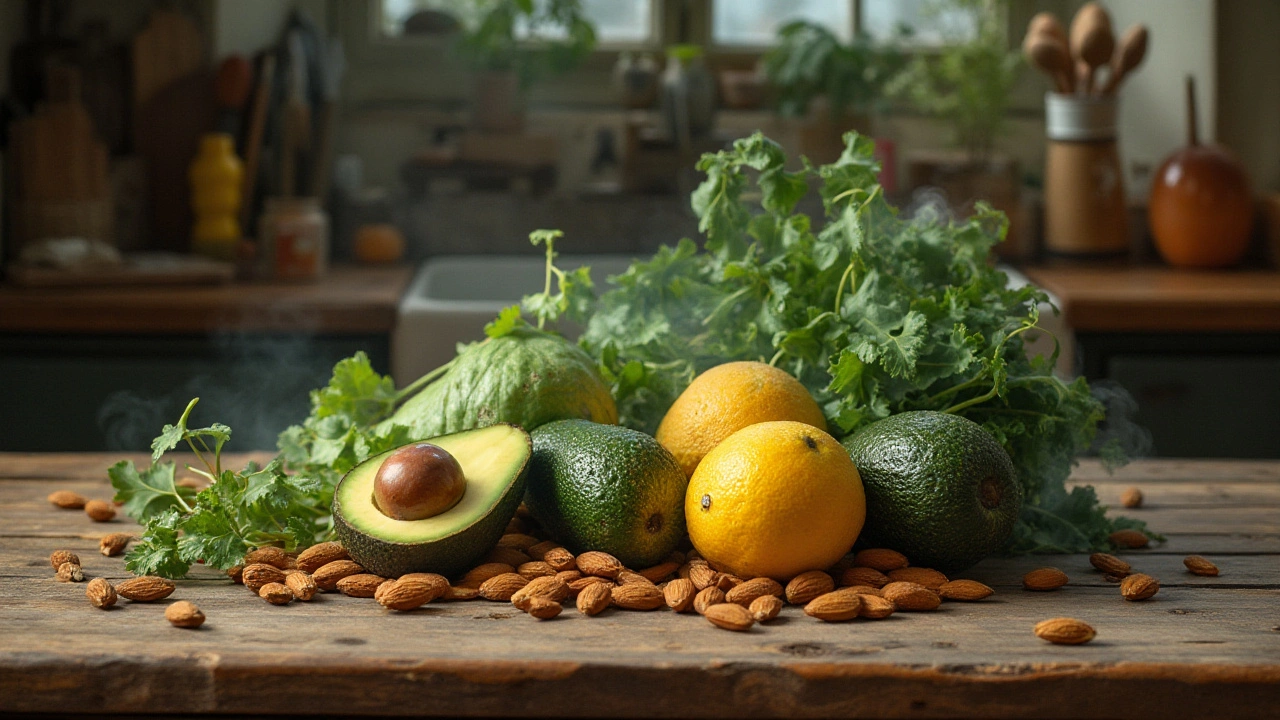Delving into the realm of veganism often means questioning everything you once thought you knew about food, even vegetables. It's easy to think of all vegetables as inherently vegan, but the journey from soil to shelf can sometimes be more complex. Amidst the racks of garden freshness lie tales entwined with ethical conundrums. As you explore this article, uncover which unsuspecting vegetables might challenge your vegan ethos and discover delightful alternatives to ensure your desserts remain indulgently ethical.
- Understanding Veganism
- The Sneaky Side of Non-Vegan Vegetables
- Bee-Friendly or Not? The Avocado Controversy
- Mushrooms: The Little Known Non-Vegan
- Zesty Lemons with a Non-Vegan Twist
- Sweet Alternatives for Vegan Desserts
Understanding Veganism
Veganism is a lifestyle choice centered around abstaining from the use of animal products, particularly in diet, and it often extends to a philosophy that rejects the commodity status of animals. While initially gaining popularity as a dietary choice, it has become a broader lifestyle and ethical movement.
The essence of veganism lies not just in food choices but in understanding the ethical, environmental, and health implications of consuming animal-derived products. This means more than avoiding meat. Non-vegan vegetables can surprise even the most conscientious vegans due to their production processes involving animal exploitation or harm.
Ethics and Environment
Many adopt a vegan diet to oppose animal cruelty and reduce their carbon footprint. The production of certain vegetables can involve practices that indirectly harm wildlife or ecosystems, such as using animal-derived fertilizers or methods like bee pollination that raise ethical concerns about animal exploitation.
Health Aspects
A plant-based diet rich in fruits, vegetables, and whole grains is associated with numerous health benefits, including reduced risk of heart disease, better weight management, and improved digestion. However, being aware of the non-vegan side of vegetables ensures that even those adopting the diet for health reasons can align their choices with their values.
Understanding these nuances helps vegans ensure their food choices contribute to a more ethical and sustainable world. Next time you reach for a crunchy celery stalk or tangy lemon, consider the path it took to get there. The pursuit of a genuinely vegan diet often involves looking beyond the label and into the practice behind the produce.
The Sneaky Side of Non-Vegan Vegetables
In the quest for a complete vegan diet, we often overlook that not all vegetables are inherently vegan. This realization can come as a jolt to many who have embraced veganism, expecting plant foods to be free from ethical dilemmas. However, the nuances of agricultural practices reveal a different story.
The Pollinated Puzzles
One of the most notable conundrums involves vegetables such as avocados and almonds. While plants themselves are vegetable-based, the farming practices associated with them raise eyebrows. The specific issue arises from the reliance on migratory beekeeping, where bees are transported en masse to pollinate crops. This practice can be distressing to bees, leading some strict vegans to question the ethics of consuming these crops.
The Mushroom Misconception
Mushrooms, often thought of as a vegan staple due to their versatility and savory flavor, can sometimes slip past the vegan filter. Certain mushroom farms utilize animal bones in their fertilizer to boost growth. This method can unwittingly make mushrooms non-vegan by extension. When selecting mushrooms, vegans should look for organic varieties grown without animal-derived fertilizers.
The Secret Sulfur
While not a vegetable, the citrus fruits such as lemons and oranges often find a home in vegan kitchens. Yet, the shock factor lies in post-harvest treatments where some are waxed using compounds that contain animal fats. Vegans should prioritize buying organic or unwaxed citrus to avoid this issue and ensure their vegan desserts maintain their ethical standing.
Non-Vegan Practices in Produce
| Vegetable/Fruit | Non-Vegan Aspect |
|---|---|
| Avocados | Pollination with migratory bees |
| Almonds | Pollination with migratory bees |
| Mushrooms | Grown using animal bone fertilizers |
| Lemons | Waxed with animal-derived compounds |
Understanding these tricky facets of the seemingly straightforward plant world can help vegans make well-informed choices, ensuring their diet aligns with their ethical values. So next time you're shopping for a salad, take a moment to ponder whether your produce has a sneakily non-vegan side.
Bee-Friendly or Not? The Avocado Controversy
The beloved avocado, adored for its creamy texture and versatility, finds itself tangled in a debate that might surprise even the most informed vegans. This unassuming fruit—or vegetable, depending on who you ask—is wrapped up in the complex web of ethical veganism due to its unique production methods.
The Role of Migratory Beekeeping
At the heart of the avocado discussion is a practice known as migratory beekeeping. To satisfy the ever-growing demand for avocados, particularly in places like California, commercial farms often engage in the practice of renting bee colonies. These bees are transported over various regions to pollinate large monocultures of avocado trees. The practice is essential for maintaining the crop’s high yield, yet it raises ethical questions for vegans.
Migratory beekeeping places stress on bee colonies, disrupting their natural behaviors and sometimes exposing them to synthetic pesticides. The travel and artificial conditions can lead to increased bee death rates, a pressing concern for those advocating cruelty-free lifestyles.
Ethical Implications for Vegans
Understanding these production practices poses a dilemma for vegans seeking to align their consumption with ethical standards. On one hand, avocados are plant-based, nutrient-rich, and fit perfectly in a multitude of vegan desserts. On the other, the reliance on commercial beekeeping challenges the humane principle that underpins veganism.
What Can Conscious Consumers Do?
- Seek Local and Organic: Whenever possible, buy avocados from local farms that may rely less on migratory beekeeping and focus on organic practices.
- Support Plant Diversity: Encourage agricultural practices that support biodiversity, thereby reducing dependency on mass pollination by bees.
- Explore Avocado Alternatives: For those committed to ethical eating, rich substitutes like hummus or nut-based spreads can replicate the creamy texture without the beekeeping baggage.
While it might seem as though your avocado toast is a no-brainer on the vegan menu, a deeper dive reveals complexities that necessitate thoughtful consideration. The avocado controversy exemplifies the ongoing journey of making ethical choices in everyday life, even when it comes to preparing those sumptuous vegan desserts.

Mushrooms: The Little Known Non-Vegan
Many would argue that mushrooms are the epitome of plant-based foods, making their potential non-vegan status quite a surprise. However, a closer look at cultivation practices reveals a fascinating and complex picture. While mushrooms themselves are not animals, the methods used to cultivate them can sometimes conflict with vegan principles.
The Mushroom Production Process
The journey of a mushroom from field to fork involves growing media prepared from a mixture of organic materials. For some types, such as button mushrooms, the nutrient-rich compost may contain animal byproducts like bone meal or manure. This reliance on animal-derived substances is where the vegan dilemma emerges.
Paul Stamets, a renowned mycologist and author, once noted:
"Mushrooms have a hidden lifecycle that many are unaware of. Understanding their growth environment sheds light on ethical concerns."
Ethical Implications
Cultivation methods that use animal products directly impact the ethical alignment of a product with a vegan lifestyle. For hardcore vegans, this presents a dilemma—should one continue to consume conventional mushrooms, or seek alternatives that adhere to their ethical standards?
Innovations in Vegan Mushroom Farming
Fortunately, some farms are innovating to cater to ethical consumers. These farms use alternative substrates, such as plant-based compost, which align better with vegan values, making the mushrooms genuinely vegan from field to table.
For those looking to indulge in vegan desserts with mushrooms, it's essential to inquire about their cultivation practices. Sometimes, even a friendly chat with a local farmer at your nearest farmer's market can reveal the stories behind your produce.
Remember, as we strive to eat ethically, even small details like a mushroom's growing medium can make a big difference. Being informed is not just power—it's empowerment for change.
Zesty Lemons with a Non-Vegan Twist
The unsuspecting lemon, a staple in kitchens across the world, is not always as vegan-friendly as it seems. While the fruit itself naturally fits vegan criteria, ethical eating isn't all about the fruit on your plate; it's about the journey it took to get there. An eye-opening fact for many within the vegan community is the treatment certain citrus fruits undergo before reaching our homes.
The Unseen Process
In pursuit of the flawless yellow hue and extended shelf-life, some lemons and other citrus fruits like limes and oranges are often coated with a protective wax. This wax isn't inherently problematic—until you consider its origins. Many commercial waxes are derived from shellac, a resin secreted by the female lac bug. This wave of reality not only shocks ethical consumers but also pushes them to rethink their zesty options.
Commercial Practices
To understand this better, one must delve into the intricate practices of citrus farming. Interestingly, certain growers have opted for carnauba wax, a plant-based alternative. However, due to the higher costs, shellac remains the prevalent choice in many mainstream supermarkets.
Identifying Vegan Lemons
For those committed to staying true to their values, buying organic produce is a practical solution, as many organic standards discourage the use of animal-derived substances. Alternatively, locally-sourced produce from farmer's markets often provides transparency about farming methods.
- Check for organic certifications when purchasing lemons.
- Inquire vendors about waxing processes at local markets.
- Consider growing your own lemons if feasible—an easy way to control their entire life cycle.
While the truth about lemons isn't as sour as you might think, informed choices ensure your lifestyle decisions align consistently with vegan diet principles. The hidden non-vegan twist in lemons may seem small in the grand scheme, but it's these small steps that pave the way to genuine ethical eating.
Sweet Alternatives for Vegan Desserts
If discovering non-vegan vegetables has left you somewhat cautious, rest assured that crafting vegan desserts doesn't require compromising on taste. The world of plant-based eating offers a vibrant palette of ingredients that will not only satisfy your sweet tooth but also align perfectly with vegan ideals.
Fruits: Nature's Candy
When it comes to crafting indulgent vegan sweets, fruits are your best bet. Not only do they provide natural sweetness, but they are also rich in flavors and textures. Consider using bananas, dates, or figs as natural sweeteners for baked goods or smoothies. They add moisture and a delightful depth of flavor.
Coconuts and Their Versatile Wonders
Coconuts are often hailed as a vegan's dream. From coconut cream to coconut sugar, these tropical delights can transform your dessert experience. Coconut cream can replace dairy in whipped creams and custards, while coconut sugar offers a sweetener with a lower glycemic index compared to regular sugar.
Transformative Sweeteners and Butters
In the search for refined sugar alternatives, you'll find plenty of choices. Agave nectar, maple syrup, and brown rice syrup are excellent liquid sweeteners. Additionally, nut butters like almond, cashew, or peanut butter introduce a rich, satisfying flavor profile to cookies and cakes.
Nuts, Seeds, and Grains: The Unexpected Allies
Almonds, walnuts, and seeds like chia or flaxseed can be used to add crunch and complexity. These ingredients also help bind ingredients together, offering both structure and nutrition to your desserts without using eggs.
Get Creative with Plant-Based Milk
The choices are endless in the world of plant-based milks—from creamy oat milk to almond milk with a subtle nutty taste. These can seamlessly replace cow's milk in recipes, maintaining the desired texture and moisture balance in your dessert creations.
Useful Vegan Dessert Tips
- For a luxurious mousse, blend ripe avocados with cacao powder and maple syrup. It's creamy, rich, and packed with nutrients.
- Use silken tofu as a base for creamy pies or pudding squares. It provides a smooth, custardy texture you'd typically expect from eggs and dairy.
- For baking, consider the plant-based revolutionary 'flax egg.' Mix one tablespoon of ground flaxseed with three tablespoons of water and let it sit to gelatinize.
In the inviting world of vegan desserts, you'll find a myriad of ways to sweeten your plate without straying from a plant-powered path. Experimenting with these alternatives not only broadens your culinary horizon but ensures your treats are as compassionate as they are delightful.




